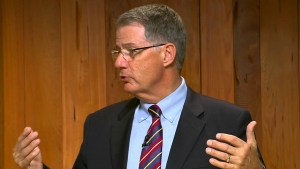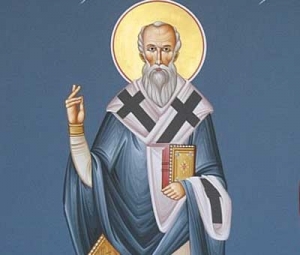In this third session of Dr. Godfrey’s Sunday school class at the Escondido URC, he develops how Christianity fared under Christendom. He explains the trajectory of challenges Christianity faced as it became wealthy and influential and, sadly, moved away from the gospel. . . . Continue reading →
Patristics
Gregory of Nyssa Against The Chiliasts
Now if we loudly preach all this, and testify to all this, namely that Christ is the power of God and the wisdom of God, always changeless, always imperishable, though He comes in the changeable and the perishable; never stained Himself, but . . . Continue reading →
Polycarp: A Model For Ministry In The Post-Christian West
Polycarp (Πολύκαρπος), whose name might be translated as fruitful was the leading pastor (ἐπίσκοπος) of Smyrna (today, Izmir, Turkey) on the Agean coast of Asia Minor. We do not know a great deal about his life. He was friends with Ignatius, the pastor of Antioch, who was (presumably) martyred about AD 115. Continue reading →
Valentinus, Marcion, And Contemporary Christianity
The Theological And Ecclesiastical Context Of An Important Modern Work
But as surely as we who read approach the book in this context of expanded interest in the Early Church, Ferguson has himself worked from within an identifiable context. That context is his active participation in a branch of the Christian tradition . . . Continue reading →
Augustine Contra Biblicism
Or if anyone should think this is untrue, I am not going to quarrel about it. After all, I am clearly dealing with Christians, who rejoice over their knowing the holy Scriptures without human guidance; and if that is the case, it . . . Continue reading →
Ignatius Of Antioch As A Remedy For Two Weaknesses In Contemporary Evangelicalism: The Reality Of Christ’s Humanity And The Reality Of The Church
Each autumn term one of my responsibilities is to spend about half the semester helping a group of students to walk through the Apostolic Fathers, a collection of second-century Christian texts which was first compiled in the 17th century. That collection has . . . Continue reading →
Cyprian Appealed To Colossians 2:11-12 In His Explanation Of Infant Baptism
For in respect of the observance of the eighth day in the Jewish circumcision of the flesh, a sacrament was given beforehand in shadow and in usage; but when Christ came, it was fulfilled in truth. For because the eighth day, that . . . Continue reading →
Another Particular Baptist Wrinkle: The Early Church Baptized Infants But For The Wrong Reasons
Introduction Sean writes with a question that I have received at least once before. Thus, I take it that this is an argument that is mooted in Particular Baptist circles: The argument comes from Particular Baptists and in essence says that while . . . Continue reading →
Ligon Duncan On Patristic Covenant Theology (1995)
Augustine: The Rule Of Faith Is The Apostles’ Creed
1. Receive, my children, the Rule of Faith, which is called the Symbol (or Creed). And when ye have received it, write it in your heart, and be daily saying it to yourselves; before ye sleep, before ye go forth, arm you . . . Continue reading →
Cyprian: Baptize Infants (253 AD)
2. But in respect of the case of the infants, which you say ought not to be baptized within the second or third day after their birth, and that the law of ancient circumcision should be regarded, so that you think that . . . Continue reading →
Hippolytus (c. 215 AD): Baptize Infants
3. And they shall put off their clothes. 4. And they shall baptize the little children first. And if they can answer for themselves, let them answer. But if they cannot, let their parents or someone from their family answer for them. . . . Continue reading →
Augustine: Infant Baptism Is The Apostolic And Universal Practice Of The Church
What the universal Church holds, not as instituted by councils but as something always held, is most correctly believed to have been handed down by apostolic authority. Since others respond for children, so that the celebration of the sacrament may be complete . . . Continue reading →
Justification In The Earliest Christian Fathers
Perhaps the first post-Apostolic use of the New Testament verb “to justify” (δικαιόω) occurs in 1 Clement, written just after 100 AD to the same Corinthian congregation to whom Paul had written half a century earlier. There is no claim of authorship . . . Continue reading →
Office Hours: Simon Gathercole On Gnosticsm, Canon, and Competing Gospels
If I say to you the word “gospel” or “the gospels” you probably think of the canonical gospels, Matthew, Mark, Luke, and John. There are scholars, however, who do not accept the canonical gospels as “the gospels.” Rather, since the 1930s an . . . Continue reading →
Justification In The Earliest Christian Fathers: 1 Clement
Perhaps the first post-Apostolic use of the New Testament verb “to justify” (δικαιόω) occurs in 1 Clement, written just after 100 AD to the same Corinthian congregation to whom Paul had written half a century earlier. There is no claim of authorship . . . Continue reading →
Niceta Of Serbia Contra Instruments In Worship Circa 370 AD
it would be tedious, dearly beloved, were I to recount every episode from the history of the Psalms, especially since it is necessary now to offer something from the New Testament and confirmation of the Old, lest one think the ministry of . . . Continue reading →
The Earliest Christians Had A Rural Mission Too
To be clear, Robinson’s point is not that early Christians prioritized rural over urban. Rather his point is that the rural dimension of early Christianity has been routinely overlooked due to a reigning paradigm that has insisted Christians were predominantly urban. In . . . Continue reading →
Tertullian On The Apologetic Power Of Sola Scriptura
Take away, indeed, from the heretics the wisdom which they share with the heathen, and let them support their inquiries from the Scriptures alone: they will then be unable to keep their ground. Tertullian, De res. 3. On the Resurrection of the . . . Continue reading →







